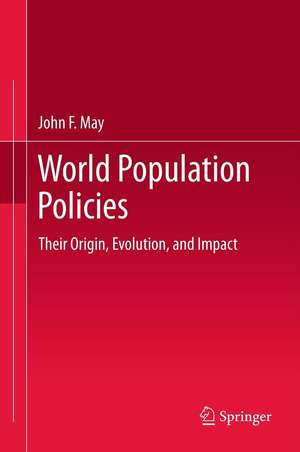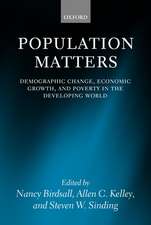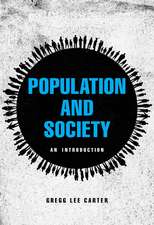World Population Policies: Their Origin, Evolution, and Impact
Autor John F. Mayen Limba Engleză Paperback – 13 apr 2014
The book is recommended for not only demographers, social scientists, and policymakers but also economists and political scientists who are interested in social and demographic change around the world. Demography students and researchers who are interested in applying knowledge on population trends and prospects in designing and evaluating public policies will find this an invaluable reference work.
| Toate formatele și edițiile | Preț | Express |
|---|---|---|
| Paperback (1) | 643.84 lei 6-8 săpt. | |
| SPRINGER NETHERLANDS – 13 apr 2014 | 643.84 lei 6-8 săpt. | |
| Hardback (1) | 650.69 lei 6-8 săpt. | |
| SPRINGER NETHERLANDS – 30 mar 2012 | 650.69 lei 6-8 săpt. |
Preț: 643.84 lei
Preț vechi: 757.46 lei
-15% Nou
Puncte Express: 966
Preț estimativ în valută:
123.20€ • 128.63$ • 101.96£
123.20€ • 128.63$ • 101.96£
Carte tipărită la comandă
Livrare economică 04-18 aprilie
Preluare comenzi: 021 569.72.76
Specificații
ISBN-13: 9789401783125
ISBN-10: 9401783128
Pagini: 368
Ilustrații: XXVIII, 340 p.
Dimensiuni: 155 x 235 x 19 mm
Greutate: 0.51 kg
Ediția:2012
Editura: SPRINGER NETHERLANDS
Colecția Springer
Locul publicării:Dordrecht, Netherlands
ISBN-10: 9401783128
Pagini: 368
Ilustrații: XXVIII, 340 p.
Dimensiuni: 155 x 235 x 19 mm
Greutate: 0.51 kg
Ediția:2012
Editura: SPRINGER NETHERLANDS
Colecția Springer
Locul publicării:Dordrecht, Netherlands
Public țintă
ResearchCuprins
General Introduction.- Chapter 1: World Population Trends and Issues.- Chapter 2: Population Policies Framework.- Chapter 3: First Public Health and Population Program.- Chapter 4: Internationalization of Population Issues.- Chapter 5: Population Policies in Developing Countries.- Chapter 6: Population Policies in Developed Countries.- Chapter 7: Effectiveness of Population Policies.- Chapter 8: Future Prospects for Population Policies.- General Conclusion.- Glossary.- References.- Index.
Recenzii
From the reviews:
“The book is a welcome addition to the literature on population policy. … the author has written an informative survey of a complex, multidimensional topic. … It is especially useful for those who want a concise overview of diverse population policies in many parts of the world including their origin, evolution, and, to a lesser extent, their impact. … The author has presented an interesting, helpful, and unified book. It can be read with profit by the layperson, the student, the specialist, and the policymaker.” (Andrzej Kulczycki, Population Studies, Vol. 67 (2), 2013)
“The book should not, and will not, pass unnoticed, and not just among specialists in the field of population studies proper, but well beyond … those engaged in geopolitics and international relations. … John May presents a thorough overview of population policies in developing countries. … This is a highly readable book. It presents scholarship at its best. The narratives are enhanced by judiciously selected statistical tables. A motto is placed in the heading of each chapter to set the tone for the substantive discussion.” (Anatole Romaniuk, Canadian Studies in Population, Vol. 39 (1-2), Spring/Summer, 2012)
“The book is a welcome addition to the literature on population policy. … the author has written an informative survey of a complex, multidimensional topic. … It is especially useful for those who want a concise overview of diverse population policies in many parts of the world including their origin, evolution, and, to a lesser extent, their impact. … The author has presented an interesting, helpful, and unified book. It can be read with profit by the layperson, the student, the specialist, and the policymaker.” (Andrzej Kulczycki, Population Studies, Vol. 67 (2), 2013)
“The book should not, and will not, pass unnoticed, and not just among specialists in the field of population studies proper, but well beyond … those engaged in geopolitics and international relations. … John May presents a thorough overview of population policies in developing countries. … This is a highly readable book. It presents scholarship at its best. The narratives are enhanced by judiciously selected statistical tables. A motto is placed in the heading of each chapter to set the tone for the substantive discussion.” (Anatole Romaniuk, Canadian Studies in Population, Vol. 39 (1-2), Spring/Summer, 2012)
Notă biografică
John F. May, a Belgian national, is a Lead Demographer at the World Bank, and a specialist in population policies and programs. Prior to joining the World Bank in 1997, he worked on many population projects around the world for UNFPA, UNICEF, USAID, and the International Union for the Scientific Study of Population (IUSSP). He was posted in Haiti, West Indies, and New Caledonia, South Pacific for the United Nations. He came to the US in 1987 and was appointed Senior Scientist at The Futures Group International, a consulting firm offering services in population and HIV/AIDS modeling, policy, and program design. In 1991-1992, he spent a year as a Visiting Scholar at the Population Reference Bureau (PRB) and was a PRB Visiting Scholar again in 2006, 2007, and 2011. He is also an Adjunct Professor of Demography at Georgetown University, Washington, DC. He earned a BA in Modern History (1973) and a MA in Demography (1985) from the Catholic University of Louvain (Belgium), and a Doctorate in Demography (1996) from the University of Paris-V (Sorbonne).
Textul de pe ultima copertă
sThis book examines the history behind the formulation, implementation, and evaluation of population policies in the more developed, the less developed, and the least developed countries from 1950 until today, as well as their future prospects. It links population policies with the theories of the demographic, epidemiological, and migratory transitions. It begins by summarizing the demographic situation around the world, with an emphasis on population policies and their underlying theories. Then, it reviews the early efforts to reduce mortality and fertility in the developing countries. This is followed by a description of the internationalization of the debate on population issues and the transformation of these programs into more formal population policies, particularly in the developing countries. The book reviews also the situation of the developed countries and their specific challenges – sub-replacement fertility, population aging, and immigration – and examines the effectiveness of population policies. It also explores the way forward and future prospects for population policies over the next decades. The book provides numerous concrete examples from all over the world, and shows how population policies are actually implemented and what have been their successes as well as their constraints. Above all, the book highlights the importance of understanding underlying demographic trends when assessing the development prospects of any country.
The book is recommended for not only demographers, social scientists, and policymakers but also economists and political scientists who are interested in social and demographic change around the world. Demography students and researchers who are interested in applying knowledge on population trends and prospects in designing and evaluating public policies will find this an invaluable reference work.
The book is recommended for not only demographers, social scientists, and policymakers but also economists and political scientists who are interested in social and demographic change around the world. Demography students and researchers who are interested in applying knowledge on population trends and prospects in designing and evaluating public policies will find this an invaluable reference work.
Caracteristici
The most exhaustive and comprehensive treatment of this historically important subject written to date Covers all components of demographic growth and their related policies Offers concrete examples of population policies and their implementation challenges















